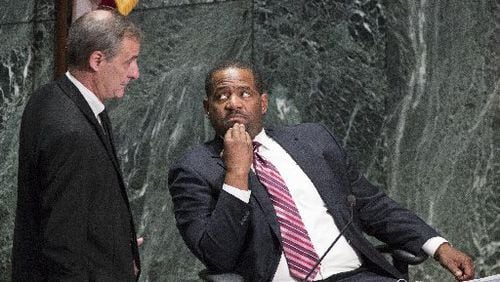Atlanta City Council last week approved Mayor Kasim Reed’s proposal allowing up to 288 employees to buy back into the city’s defined benefits pension program — a move that could increase the pension system’s unfunded liability by up to $30 million.
The Dec. 4 vote was one of two controversial pension board measures. The council will consider merger of the city's three pension boards during a specially called meeting Wednesday.
Some of the city’s top administrators and elected officials are among the employees eligible for reinstatement into the defined benefit system: Reed’s chief of staff Candace Byrd, six city council members and a handful of their aides.
Attorneys in the law department who helped draft the proposed legislation also are eligible for reinstatement.
Council members eligible for return to the system are: Natalyn Archibong, Ceasar Mitchell, Mary Norwood, Joyce Sheperd, Howard Shook and Ivory Lee Young.
City ethics officer Jabu M. Sengova said there wasn’t a problem with council members voting on the pension matter, as some of them did.
“The Ethics Office has previously determined that participation in the defined benefits plan does not prohibit council members from voting on the policy,” Sengova said. “The Code of Ethics was not intended to prohibit members of the city council from participating in matters of general policy when they have interests shared by a substantial segment of the public.”
A spokeswoman for Reed said all active employees hired between Jan. 1, 2001 and Dec. 31, 2005 are eligible.
The spokeswoman said reinstatements are appropriate for “employees who were affected by the lack of adequate information and education” when the city switched from a defined benefits to a defined contribution plan in 2001, then allowed some employees to opt back into the defined benefits system in 2005.
“The administration heard from a number of employees who were confused about which plan they were in and felt they were not given adequate information and education about the two different plans in either 2001 or 2005,” spokeswoman Jenna Garland wrote in an email to The Atlanta Journal-Constitution.
A defined-benefit pension guarantees a specified annual payment upon retirement that is predetermined by a formula based on the employee’s earnings history. A defined contribution plan is less expensive for the employer and is more akin to a 401-k.
A Nov. 29 report by Segal Consulting says the average benefit for people already in the system is $49,567 a year. The average payment for the newly eligible group of employees is projected to be $73,512, according to the report.
In order to buy into the defined benefits plan, employees will have to rollover all money in their defined contribution plans. Those employees would also need to contribute 1 to 2 percent of salary for all periods of employment between 2001 and 2011; then an additional 6 to 7 percent of salary for employment between 2011 and 2018.
Even with all of those contributions from employees buying back into the system, “the unfunded liability is still expected to grow by over $30 million,” the Segal Consulting report says.
Some employees have concerns
Doug Strachan, chairman of the city’s general employees pension board, said his group has several concerns: the annual cost of servicing the additional employees; the lack of detail about how money owed by employees buying into the system are to be paid; and how benefits will be reduced for employees who retire before all their back payments are paid.
“There is an enduring saying: haste makes waste,” Strachan said. “The board feels that incurring significant costs without a more comprehensive analysis than what was asked for and provided is unwise.”
Councilman Howard Shook said he asked the city’s law department if he could vote on the issue, and they confirmed that he could. Shook said he’s not sure he’ll buy back into the defined benefit system, but he supported the change.
“I think we try to do right by the workforce,” Shook said. “It’s not always affordable to award all the raises that we’re asked to approve. And so we do normally try to look for other things we can do to make employment here more fairly compensated. And I think this is one of those instances.”
Other employees eligible to buy back into the system hold positions such as: employee benefits director, airport concessions manager, along with budget and fiscal policy chief.
About the Author








